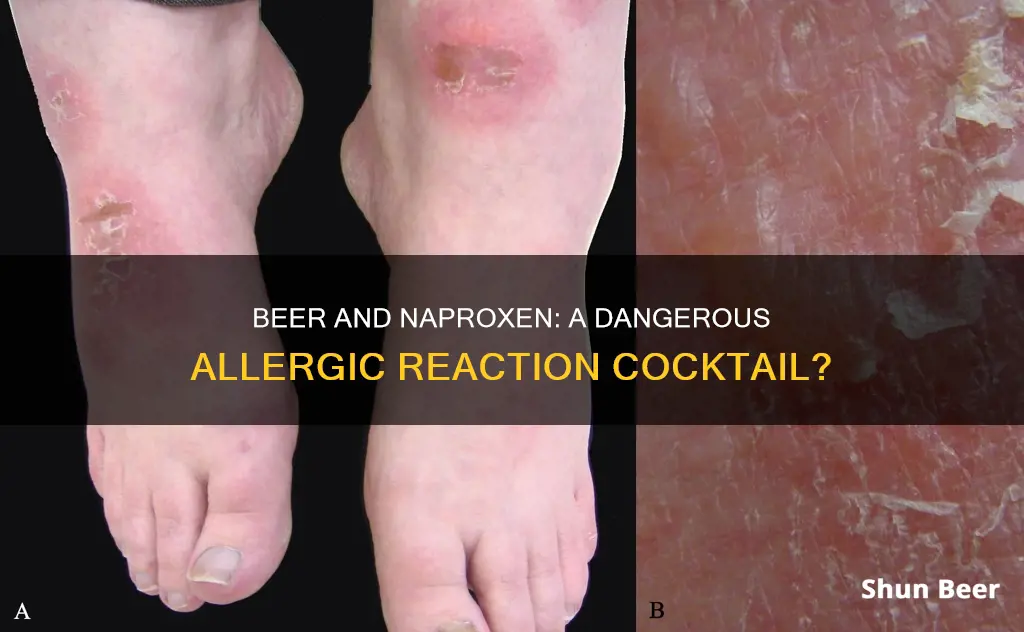
Beer allergies are rare, but they can happen. Beer contains many ingredients, and you may be allergic to one of them. These include wheat, barley, gluten, histamines, sulfites, and yeast. An allergy to beer will likely cause symptoms similar to other allergic reactions, such as abdominal pain, bloating, and chest tightness. On the other hand, Naproxen is a nonsteroidal anti-inflammatory drug (NSAID) that can be highly beneficial in treating issues such as inflammation or pain in the muscles and joints. The NHS states that drinking alcohol while taking naproxen is usually fine when done in moderation. However, drinking large quantities of alcohol alongside taking naproxen may lead to unwanted side effects, including cardiovascular issues.
| Characteristics | Values |
|---|---|
| Beer allergy | Rare |
| Beer allergy symptoms | Abdominal pain and bloating, tightness of the chest, hives, wheezing, chest pain, rash, itching, gastrointestinal issues (e.g. diarrhea, heartburn) |
| Naproxen side effects | Indigestion, heartburn, stomach pain, nausea, headache, dizziness, drowsiness, bruising, itching, rash, swelling or ringing in your ears |
| Naproxen serious side effects | Signs of an allergic reaction (runny or stuffy nose, wheezing or trouble breathing, hives, swelling in your face or throat), severe skin reaction (fever, sore throat, burning eyes, skin pain, red or purple skin rash with blistering and peeling) |
| Naproxen safety advice | Avoid drinking alcohol when taking naproxen, as alcohol may increase your risk of stomach bleeding |
What You'll Learn

Beer allergy symptoms
Beer allergies are rare, but they can be dangerous. If you think you are allergic to beer, it is important to seek a proper diagnosis.
The symptoms of a beer allergy are similar to those of other allergic reactions. They include:
- Abdominal pain and bloating
- Tightness of the chest
- Hives
- Wheezing
- Chest pain
These symptoms can occur almost immediately after consuming beer and should be considered severe and potentially life-threatening. If you experience any of these symptoms, seek immediate medical attention.
If your symptoms are very mild, you may have a beer sensitivity or intolerance rather than a true allergy. This can be uncomfortable, but it is not an immune system response and is usually less serious. Symptoms of a beer intolerance include:
- Sneezing
- Nausea or vomiting
- Diarrhea
- Constipation
- Cramping
- Gas
- Bloating
Beer Allergy Diagnosis
The best way to determine if you have a beer allergy is to visit an allergist who can perform specific allergy tests. One of the easiest ways to diagnose allergies is through a skin prick test, which takes about 15 minutes. If a skin prick test cannot be used, other methods such as an elimination diet or provocation test may be used.
Beer Allergy Treatment
If you are allergic to beer, the best treatment is avoidance. Although most beer allergy symptoms are not life-threatening, it is important to stay away from the ingredients that cause your allergy.
Beer Overload: Stinging Sensation in Pee?
You may want to see also

Beer allergy causes
Beer allergies are rare, but they can be dangerous. If you experience any symptoms of an allergic reaction after drinking beer, such as abdominal pain, chest tightness, hives, wheezing, or chest pain, seek immediate medical attention. These symptoms can be life-threatening and should not be taken lightly.
If you have milder symptoms, such as sneezing, you may have a beer sensitivity or intolerance rather than a true allergy. This is still uncomfortable, but it is not an immune system response and is usually less serious.
Beer contains many ingredients, and it is likely that an allergy to one of these specific ingredients is causing your symptoms. The main ingredient in beer is water, but it also generally includes malt barley, brewer's yeast, hops, and assorted colorings, flavorings, and preservatives. Depending on the brand, beer may also contain other grains, such as wheat, sorghum, or corn.
A 2014 study found that sensitivity to sorghum or sorghum malt was the most common cause of beer allergies. Many patients who are allergic to wheat also react to barley in beer. Alcohol can also act as a cofactor in allergic reactions, enhancing the absorption of allergens.
If you think you may have a beer allergy, it is important to seek a proper diagnosis from an allergist. They can perform specific allergy tests, such as skin prick tests or blood tests, to determine if you have an allergy and what specific ingredient is causing it.
If you are allergic to beer, the best treatment is avoidance. Stay away from the ingredients you are allergic to and be sure to read labels carefully. You may still be able to drink certain types of beer that do not contain the allergen, and you can also drink other alcoholic beverages that you are not allergic to.
Beer and Teeth Whitening: What You Need to Know
You may want to see also

Beer allergy diagnosis
True beer allergies are rare, and you may actually have an intolerance to beer. However, it’s important to seek a proper diagnosis to determine if you do have a true beer allergy.
The best way to determine if you have a beer allergy is to visit an allergist. An allergist can perform specific allergy tests to diagnose allergies. One of the easiest ways to diagnose allergies is to perform a skin prick allergy test. This test takes about 15 minutes to diagnose allergies. If your allergist cannot use a skin prick test to diagnose beer allergy, there are other methods like an elimination diet or provocation test.
During an elimination test, you should avoid beer to see if your symptoms subside. In contrast, a provocation test involves consuming a small amount of beer to see if it evokes a reaction. You should never attempt a provocation test on your own. These challenges should be done in a clinical setting.
If you do tend to experience allergy-like symptoms after drinking just one or two beers, it’s a good idea to see your doctor. A physician can help by obtaining a detailed history, performing a physical examination, and conducting blood tests and other types of testing to rule out other causes for your symptoms.
Beer Allergy Symptoms
If you’re allergic to beer, you’ll probably have symptoms like those of other allergic reactions. This includes abdominal pain and bloating, and tightness of the chest. An allergic reaction to food usually happens within a couple of hours.
Allergic reactions that involve hives, wheezing, and chest pain can occur almost immediately and should be considered severe and potentially life-threatening. If you experience these symptoms, you should seek immediate medical attention.
If your symptoms are very mild, you may have a beer sensitivity rather than a true allergy. It can be uncomfortable, but it’s not an immune system response and isn’t as serious. You can take over-the-counter medications to relieve milder symptoms such as sneezing.
Beer Drinking in Yellowstone: What's Allowed?
You may want to see also

Naproxen side effects
Naproxen is a medication that can be prescribed to treat pain and inflammation. It belongs to a group of drugs called nonsteroidal anti-inflammatory drugs (NSAIDs). While it can be effective in reducing pain and inflammation, it may also cause several side effects, ranging from mild to severe.
Some of the more common side effects of naproxen include:
- Feeling sleepy or tired
- Dizziness
- Headache
- Drowsiness
- Blurred vision
- Confusion
- Stomach pain or discomfort
- Nausea
- Diarrhea
- Constipation
- Heartburn
It's important to note that these side effects may go away as your body adjusts to the medication. However, if they persist or become bothersome, it's recommended to consult a doctor or pharmacist for advice.
Naproxen can also cause serious side effects that require immediate medical attention. These include:
- Severe indigestion, heartburn, stomach pain, nausea, or vomiting
- Vomiting blood or material that looks like coffee grounds
- Blood in urine or stools
- Swelling of the face, fingers, feet, or lower legs
- Severe and continuing nausea
- Chest pain
- Difficulty breathing
- Severe stomach burning, cramping, or pain
- Unusual bleeding or bruising
- Skin rash or blisters with fever
In rare cases, naproxen can cause a serious allergic reaction (anaphylaxis). Signs of a severe allergic reaction include:
- Swelling of the lips, mouth, throat, or tongue
- Difficulty breathing
- Tightness in the throat
- Skin, tongue, or lips turning blue, grey, or pale
- Sudden confusion, drowsiness, or dizziness
If you experience any of these symptoms, seek emergency medical help immediately.
Additionally, naproxen may increase the risk of heart disease and can cause ulcers and bleeding in the stomach and intestines, especially in elderly patients or those with a history of peptic ulcer disease and/or GI bleeding. It is important to discuss the potential risks and benefits with your doctor before taking naproxen.
Beer Drinking Laws in Alaska: Age Limit Explained
You may want to see also

Naproxen safety advice
Naproxen is a nonsteroidal anti-inflammatory drug (NSAID) that can be used to treat pain and inflammation. While it is usually safe to consume naproxen and alcohol together, there are some important safety considerations to keep in mind.
Side Effects and Risks
Naproxen can cause several side effects, including indigestion, heartburn, stomach pain, nausea, headache, dizziness, drowsiness, bruising, itching, rash, and swelling. It is important to note that naproxen may increase the risk of stomach bleeding, especially when combined with alcohol. Therefore, it is recommended to avoid drinking alcohol while taking naproxen to reduce the risk of unwanted side effects.
Drug Interactions
Naproxen may interact with other medications, including antidepressants, seizure medications, blood thinners, diuretics, heart or blood pressure medications, and insulin or oral diabetes medicines. It is important to consult a doctor or pharmacist before using naproxen with any other medication.
Dosage and Intake
The safe dosage of naproxen depends on individual factors, such as the reason for taking the medication and the general state of health, especially kidney function. Adults are typically advised to start with the lowest dosage and adjust as needed in consultation with a doctor or pharmacist.
Alcohol Consumption Guidelines
It is recommended for adults to consume no more than 14 units of alcohol per week. This is equivalent to six medium glasses of wine or seven 50ml measures of spirits. However, it is important to note that there is no completely safe level of alcohol consumption, and individual factors, such as general health, can affect the recommended intake.
Allergic Reactions
True allergies to beer are rare, and allergic reactions are more commonly caused by specific ingredients in beer, such as wheat, barley, or other grains. Allergic reactions can range from mild symptoms like hives and itching to severe and potentially life-threatening anaphylaxis. If you experience any signs of an allergic reaction, such as hives, wheezing, or chest pain, seek immediate medical attention.
Precautions
If you are taking naproxen, it is important to monitor your alcohol intake and avoid excessive consumption to reduce the risk of adverse effects. Additionally, if you have any concerns or experience side effects, consult a healthcare professional for personalised advice.
Grapefruit Beer and Lipitor: A Safe Mix?
You may want to see also
Frequently asked questions
Drinking beer and taking naproxen together does not typically cause an allergic reaction. However, both substances can irritate the stomach lining and increase the risk of gastritis, which can be uncomfortable.
The side effects of drinking beer with naproxen can include cardiovascular issues, irritation, and soreness in the stomach.
According to the NHS, it is generally safe to drink alcohol while taking naproxen, as long as both substances are consumed in moderation. However, if you have been drinking large amounts of alcohol, it is recommended to avoid taking naproxen to prevent any unwanted side effects.
The symptoms of an allergic reaction to beer can include abdominal pain, bloating, chest tightness, hives, wheezing, and shortness of breath. In severe cases, anaphylaxis may occur, which is a life-threatening allergic reaction.
The symptoms of an allergic reaction to naproxen can include a runny or stuffy nose, wheezing, hives, swelling in the face or throat, fever, sore throat, and a skin rash. If you experience any of these symptoms, seek immediate medical attention.







